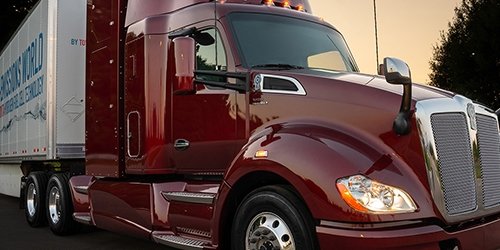|

With the same brute hauling power and zero emissions of the original Project Portal fuel cell-powered Class 8 truck, Project Portal 2.0 adds 50% more driving range. (Bill Visnic)
Toyota launches second-gen fuel-cell Class 8
At a late-July auto-industry conference in Michigan, Toyota revealed the second generation of its Project Portal prototype Class 8 heavy-duty truck driven electrically from fuel-cell power. The Project Portal 2.0 maintains the burly power and hauling capacity of the first Project Portal truck, but adds 50% more driving range, said Andrew Lund, chief engineer for Toyota Motor North America Research & Development.
As the new truck glided up noiselessly behind him, Lund said this “Beta” version of the original Project Portal “Alpha” fuel-cell truck—powered by the pirated fuel-cell stack and related components of two Mirai fuel-cell sedans—maintains its 670-hp and 1325 lb·ft (1796 N·m) output and 80,000-lb (36,288-kg) gross combined weight (GCW) ratings while now expanding total driving range to 300 mi (483 km). The new range capability, Lund said, takes the new Project Portal 2.0 beyond the comparatively limited drayage duty of the first Project Portal heavy-duty truck.
Lund called the Project Portal 2.0 the “next step as we expand our hydrogen footprint yet again.”
Engineering consultancy Ricardo assisted Toyota with systems integration and packaging on both the Beta and Alpha trucks, including work on the fuel cells, power electronics, hydrogen tanks, cooling systems, batteries, electric motors and transmission. Many of the ancillary systems such as the air compressor, power steering and HVAC were electrified and their controls integrated into the vehicle’s J1939 CAN bus.
The Beta truck was constructed by Ricardo at its Detroit Technology Campus in Belleville, Mich.
Emissions reductions for busy ports
With more than a year of service and nearly 10,000 mi (16,093 km) of testing and actual drayage service in and around the congested California ports of Los Angeles and Long Beach, the first Project Portal truck demonstrated electric propulsion via fuel cell is viable for such duty cycles. With the new, longer-range Project 2.0 truck, Toyota said it is one step closer to its goal of eliminating carbon-dioxide emissions from its Toyota Logistics operations at the port of Long Beach.
The company also believes fuel cell-powered heavy-duty trucks could be one solution to significantly cut the emissions related to the 16,000-plus trucks currently working in the environs of the Los Angeles and Long Beach ports—and that number of trucks is projected to double by 2030.
“Our goal with the first truck was to see if it could be accomplished, and we did that,” said Craig Scott, senior manager for Toyota’s North American Electrified Vehicle & Technologies Office, in a release. “This time we're looking at commercial viability. We want to help make a difference—a significant difference when it comes to the air quality not only in the LA area, but across the U.S. and around the globe.”
“Electrified vehicles are the future,” Lund said, adding that “Heavy-duty vehicles are perhaps where fuel-cell technology can make the most significant impact.”
|

